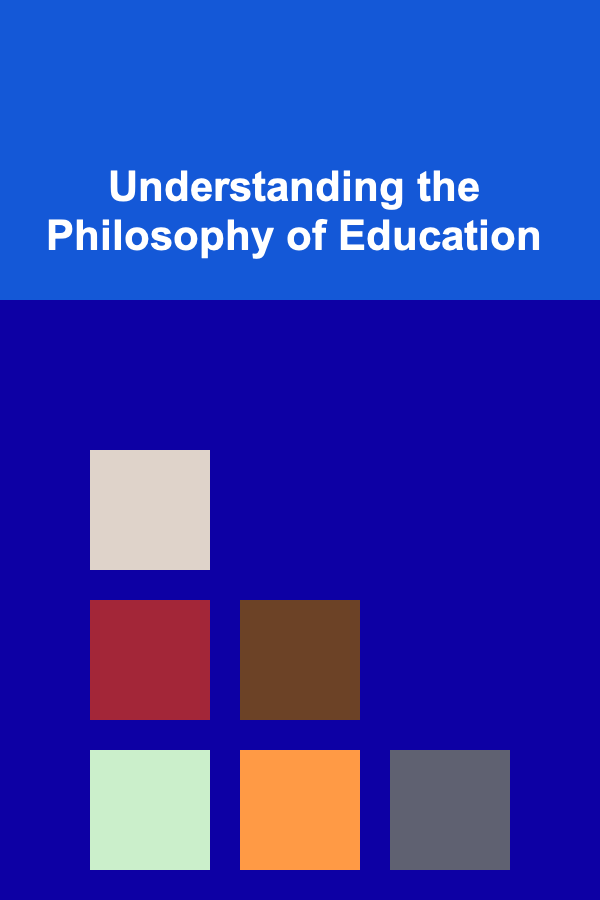
Understanding the Philosophy of Education
ebook include PDF & Audio bundle (Micro Guide)
$12.99$6.99
Limited Time Offer! Order within the next:

Education is more than just the transmission of facts and skills. At its core, it's a deeply philosophical endeavor concerned with the very purpose of human existence, the nature of knowledge, and the best way to cultivate well-rounded, responsible, and engaged citizens. Understanding the philosophy of education requires us to delve into these fundamental questions, exploring different perspectives and grappling with complex ethical considerations. This exploration isn't just for academics; it's essential for educators, policymakers, parents, and anyone interested in shaping the future through learning.
What is Philosophy of Education?
Philosophy of education is a branch of philosophy that examines the goals, forms, methods, and effects of education. It asks fundamental questions like: What is the purpose of education? What knowledge is most worth knowing? How should students be taught? What role should schools play in society? And what does it mean to be an educated person?
It's important to distinguish between different levels of philosophical inquiry within education. There's the level of grand, overarching theories about the nature of learning and human development, often associated with historical figures like Plato, Rousseau, and Dewey. Then there's the level of more practical considerations about curriculum design, classroom management, and assessment strategies. Finally, there's the individual educator's personal philosophy of education, which informs their daily practice and shapes their interactions with students.
Philosophy of education is also interdisciplinary. It draws on insights from epistemology (the study of knowledge), metaphysics (the study of reality), ethics (the study of morality), political philosophy, and even psychology and sociology. This makes it a rich and complex field, but also a rewarding one for those willing to engage with its challenges.
Key Branches of Philosophy and Their Relevance to Education
To truly understand educational philosophies, it's crucial to grasp how different branches of philosophy inform their core tenets:
- Epistemology: This branch deals with the nature of knowledge, justification, and belief. Educational philosophies differ widely in their epistemological assumptions. For example, some emphasize the acquisition of objective facts (a realist perspective), while others focus on the construction of meaning through experience (a constructivist perspective). Epistemology informs how we decide what knowledge is worth teaching and how we should teach it. Questions like "What is truth?" and "How do we know that we know?" are central to epistemological discussions in education.
- Metaphysics: This branch explores the fundamental nature of reality. Metaphysical beliefs about human nature, the existence of free will, and the relationship between mind and body influence educational goals and methods. For instance, if we believe that humans are inherently rational beings, we might prioritize critical thinking and intellectual development. If we believe in the importance of individual potential, we might focus on personalized learning and fostering self-discovery. Metaphysics helps us answer questions about what it means to be human and how education can contribute to human flourishing.
- Ethics: This branch concerns itself with moral principles and values. Ethical considerations are paramount in education. We must grapple with questions about fairness, justice, and the moral development of students. Ethical theories influence our approaches to discipline, character education, and the teaching of controversial topics. For example, different ethical frameworks (like utilitarianism, deontology, and virtue ethics) might lead to different approaches to resolving conflicts in the classroom.
- Axiology: Axiology, sometimes considered a branch of ethics and aesthetics, focuses on value. It asks what things are inherently good or desirable. In education, axiology helps us determine what values should be promoted through the curriculum and school culture. This includes moral values like honesty, compassion, and responsibility, as well as aesthetic values like beauty, creativity, and appreciation for the arts. Axiology informs our understanding of what constitutes a good education and a good life.
- Logic: The study of reasoning and argumentation, logic is fundamental to critical thinking and problem-solving. Education should cultivate logical reasoning skills, enabling students to analyze information, evaluate arguments, and make sound judgments. Logic plays a crucial role in curriculum development, instructional design, and assessment. By teaching students how to think logically, we empower them to become independent and informed citizens.
Major Schools of Thought in Philosophy of Education
Several major schools of thought have shaped the landscape of educational philosophy. Understanding these perspectives provides a framework for analyzing different approaches to education and identifying their underlying assumptions.
- Idealism: Rooted in Plato's philosophy, Idealism emphasizes the importance of ideas, reason, and the pursuit of truth. Idealist educators believe that the purpose of education is to cultivate intellectual and moral excellence. They prioritize the study of classic literature, philosophy, and the arts, believing that these subjects provide access to timeless truths and universal values. The teacher plays a central role in guiding students towards enlightenment and self-realization. Learning is seen as a process of uncovering innate knowledge and developing intellectual abilities. Critical thinking and rigorous intellectual exercise are central.
- Realism: Inspired by Aristotle, Realism emphasizes the objective world and the importance of acquiring accurate knowledge about it. Realist educators believe that the purpose of education is to prepare students for life in the real world by providing them with the knowledge and skills they need to succeed. They prioritize the study of science, mathematics, and technology, believing that these subjects provide the foundation for understanding the natural world and solving practical problems. The teacher is seen as an expert who transmits knowledge to students. Emphasis is placed on facts, logic, and verifiable truths.
- Pragmatism: Developed by thinkers like John Dewey, Pragmatism emphasizes experience, experimentation, and the practical application of knowledge. Pragmatist educators believe that the purpose of education is to prepare students for active participation in a democratic society by providing them with opportunities to learn through experience and solve real-world problems. They prioritize the study of interdisciplinary subjects, project-based learning, and community engagement. The teacher is seen as a facilitator who guides students in their learning journey. Learning is seen as an active process of constructing meaning through experience. The focus is on practical skills and problem-solving abilities.
- Existentialism: Existentialism emphasizes individual freedom, responsibility, and the search for meaning. Existentialist educators believe that the purpose of education is to help students discover their own unique identities and create their own values. They prioritize the study of the humanities, philosophy, and the arts, believing that these subjects provide opportunities for self-reflection and personal growth. The teacher is seen as a guide who helps students explore their own values and make choices about their lives. Emphasis is placed on self-discovery, personal meaning, and authentic experience.
- Perennialism: Perennialism advocates for a curriculum based on enduring ideas and universal principles. Perennialist educators believe that the purpose of education is to cultivate intellectual and moral excellence by exposing students to the "Great Books" and timeless works of literature, philosophy, and art. They emphasize the development of reasoning skills, critical thinking, and moral character. The teacher is seen as a facilitator of intellectual discussion and a guardian of cultural heritage. The focus is on transmitting essential knowledge and developing intellectual skills that are relevant across time and cultures.
- Essentialism: Essentialism focuses on transmitting a core set of essential knowledge and skills that are necessary for all students to succeed in modern society. Essentialist educators believe that the purpose of education is to prepare students for work, citizenship, and responsible adulthood. They prioritize the study of core subjects like reading, writing, mathematics, science, and history. The teacher is seen as an authority figure who imparts knowledge and enforces discipline. Emphasis is placed on academic achievement, standardized testing, and the acquisition of practical skills.
- Progressivism: Building on Pragmatism, Progressivism emphasizes student-centered learning, experiential education, and social reform. Progressivist educators believe that the purpose of education is to prepare students to be active and engaged citizens who can contribute to a more just and equitable society. They prioritize the study of real-world problems, project-based learning, and collaborative activities. The teacher is seen as a facilitator who guides students in their learning journey and encourages them to take ownership of their education. The focus is on developing critical thinking skills, problem-solving abilities, and social responsibility.
- Critical Theory: Critical Theory examines the role of power, ideology, and social structures in shaping education. Critical theorists believe that education can be used to perpetuate social inequality and oppression, or it can be used to challenge these systems and promote social justice. They emphasize the importance of critical thinking, social awareness, and activism. The teacher is seen as a facilitator of critical dialogue and a advocate for social change. The focus is on exposing hidden power dynamics, challenging dominant narratives, and empowering marginalized groups.
The Importance of Understanding Your Own Philosophy of Education
While understanding the major schools of thought is crucial, it's equally important to develop your own personal philosophy of education. This philosophy will guide your teaching practices, shape your interactions with students, and inform your decisions about curriculum and assessment.
To develop your own philosophy, consider the following questions:
- What do you believe is the primary purpose of education?
- What knowledge and skills are most worth knowing?
- How do you believe students learn best?
- What role should the teacher play in the learning process?
- What values and principles do you want to instill in your students?
- How can education contribute to a more just and equitable society?
Reflecting on these questions will help you articulate your beliefs about education and develop a coherent and consistent philosophy that guides your practice. This is not a static process; your philosophy will likely evolve over time as you gain experience and encounter new ideas.
How Philosophy of Education Impacts Classroom Practice
The philosophy of education adopted, whether consciously or unconsciously, profoundly impacts every aspect of classroom practice. From the selection of content to the methods of assessment, philosophical beliefs shape the learning environment.
- Curriculum Design: An idealist educator might prioritize classical literature and philosophy, while a realist educator would emphasize science and mathematics. A pragmatist educator would focus on interdisciplinary projects that connect learning to real-world problems. An essentialist would focus on core subjects and standardized tests. The underlying philosophy dictates what knowledge is deemed most valuable and how it is organized.
- Instructional Strategies: A traditional, teacher-centered approach might be favored by idealists and realists, while a more student-centered approach might be favored by pragmatists and progressivists. Existentialist educators might employ methods that encourage self-reflection and personal exploration. The chosen methodology reflects the beliefs about how students learn most effectively.
- Classroom Management: Authoritarian approaches might be used to maintain order in essentialist classrooms, while more democratic and collaborative approaches might be used in pragmatist or progressivist classrooms. Ethical considerations related to fairness, justice, and student autonomy are central to classroom management. The chosen approach reflects the values and beliefs about student responsibility and the role of authority.
- Assessment: Standardized tests and objective measures might be emphasized in essentialist and realist classrooms, while more authentic and performance-based assessments might be used in pragmatist and progressivist classrooms. Existentialists might resist standardized testing altogether, favoring self-reflection and personal narratives as forms of assessment. The purpose of assessment, whether to measure knowledge acquisition or to promote critical thinking, is philosophically driven.
- Teacher-Student Relationships: The teacher's role is shaped by their philosophical beliefs. In some classrooms, the teacher is seen as an expert who transmits knowledge, while in others, the teacher is seen as a facilitator who guides student learning. The relationship between teacher and student is often hierarchical in traditional approaches and more egalitarian in student-centered approaches.
Challenges and Criticisms of Different Philosophical Approaches
Each philosophical approach to education has its strengths and weaknesses, and has faced criticism over time. It's important to be aware of these challenges when evaluating different perspectives and developing your own philosophy.
- Idealism: Critics argue that Idealism can be too abstract and detached from the real world. It might not adequately prepare students for the practical challenges of life or for specific career paths. It can also be seen as elitist, prioritizing intellectual pursuits over practical skills.
- Realism: Critics argue that Realism can be too focused on facts and objective knowledge, neglecting the importance of creativity, imagination, and personal meaning. It might not adequately address the emotional and social needs of students. It can also be overly focused on standardized testing and external assessments.
- Pragmatism: Critics argue that Pragmatism can be too relativistic and lacking in firm moral principles. It might not provide students with a clear sense of values or a strong foundation in traditional knowledge. It can also be challenging to implement effectively, requiring significant resources and teacher training.
- Existentialism: Critics argue that Existentialism can be too individualistic and focused on personal meaning, neglecting the importance of social responsibility and collective action. It might not adequately prepare students for the demands of a complex and interdependent society. It can also be difficult to translate into practical classroom strategies.
- Perennialism: Critics argue that the "Great Books" canon is often biased towards Western culture and neglects the contributions of other cultures and perspectives. It might not be relevant to the diverse needs and interests of contemporary students. It can also be seen as overly traditional and resistant to change.
- Essentialism: Critics argue that Essentialism can be too rigid and focused on standardized testing, neglecting the importance of creativity, critical thinking, and individual differences. It might not adequately prepare students for the challenges of a rapidly changing world. It can also lead to a narrow and inflexible curriculum.
- Progressivism: Critics argue that Progressivism can be too unstructured and lacking in clear academic standards. It might not adequately prepare students for higher education or for competitive careers. It can also be difficult to manage classrooms effectively with student-centered approaches.
- Critical Theory: Critics argue that Critical Theory can be too focused on negativity and critique, neglecting the importance of positive solutions and constructive action. It might not adequately address the emotional and social needs of students. It can also be seen as overly political and divisive.
The Evolving Landscape of Educational Philosophy
The philosophy of education is not static; it evolves in response to changing social, cultural, and technological conditions. New ideas and perspectives continue to emerge, challenging traditional assumptions and pushing the boundaries of educational thought.
Some of the key trends shaping the future of educational philosophy include:
- The rise of technology: Technology is transforming the way we learn and teach, raising new questions about the role of technology in education, the digital divide, and the ethical implications of artificial intelligence.
- Globalization and multiculturalism: As the world becomes increasingly interconnected, education must prepare students to be global citizens who can understand and appreciate diverse cultures and perspectives.
- Social justice and equity: There is a growing emphasis on addressing social inequalities and ensuring that all students have access to a high-quality education, regardless of their background or circumstances.
- Personalized learning: Technology and data analytics are enabling educators to tailor instruction to meet the individual needs and interests of each student.
- The importance of social-emotional learning (SEL): There is a growing recognition of the importance of developing students' social-emotional skills, such as empathy, self-awareness, and resilience.
Conclusion
Understanding the philosophy of education is an ongoing journey of inquiry, reflection, and critical engagement. By exploring different perspectives, grappling with complex ethical considerations, and developing your own personal philosophy, you can become a more informed and effective educator. The philosophy of education matters because it shapes the lives of countless students and contributes to the creation of a more just, equitable, and flourishing society. It is a continuous process of self-reflection and adaptation. Understanding the fundamental questions is a key to be a better educator.

How to Use Clear Storage Bins for Overflow Books
Read More
How to Use Labels to Keep Family Spaces Tidy
Read More
The Ultimate Guide to Tips for Reducing Impulse Buying and Staying on Budget
Read More
How to Install a Kitchen Backsplash
Read More
How To Build Excellent Customer Relationships
Read More
How to Start a College Savings Plan (529 Plan)
Read MoreOther Products

How to Use Clear Storage Bins for Overflow Books
Read More
How to Use Labels to Keep Family Spaces Tidy
Read More
The Ultimate Guide to Tips for Reducing Impulse Buying and Staying on Budget
Read More
How to Install a Kitchen Backsplash
Read More
How To Build Excellent Customer Relationships
Read More